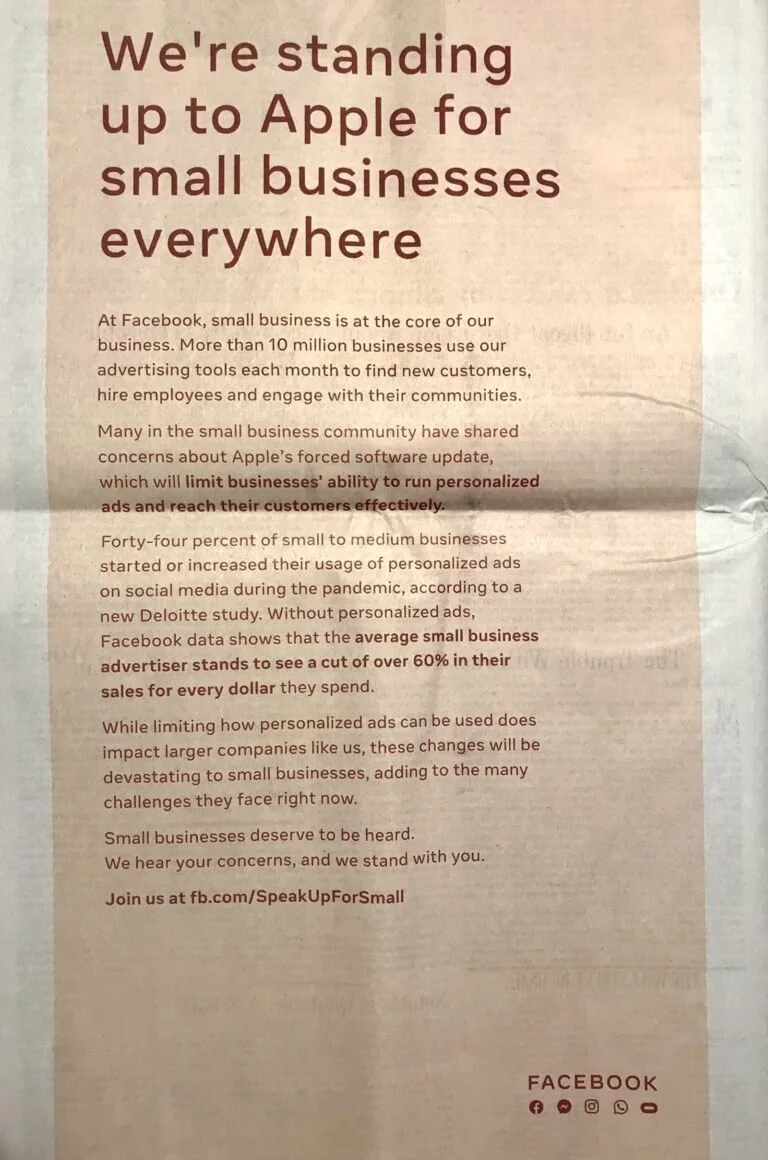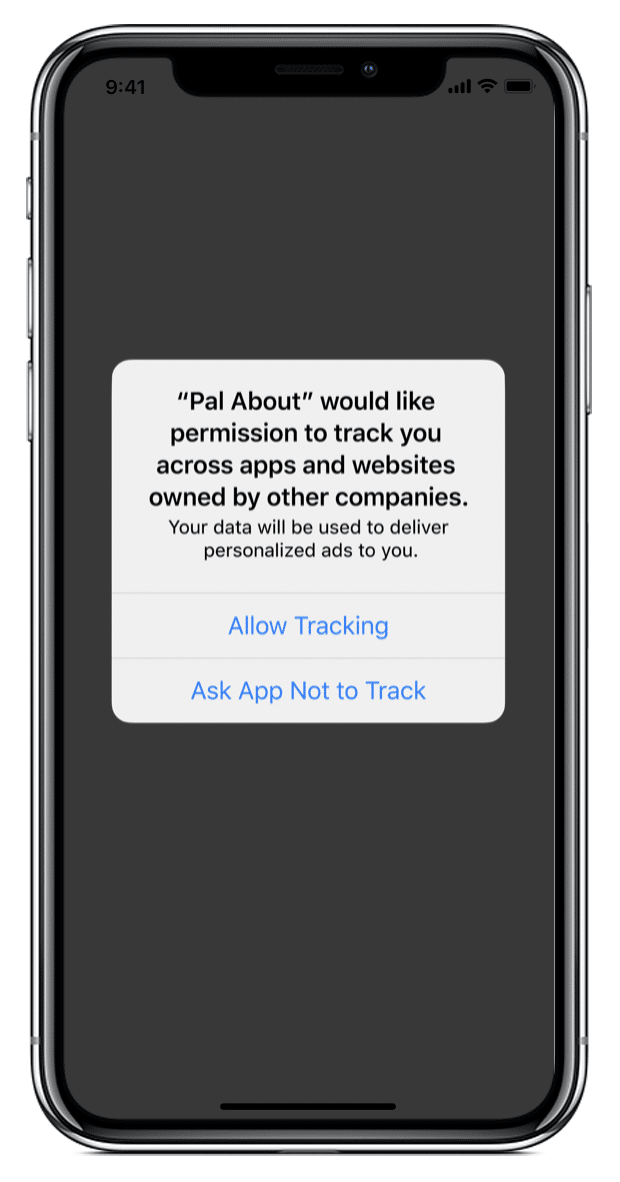Apple's iOS 14 update and social media ads unpacked in plain English
So as you may have heard recently there is a bit of a tech war going on between Facebook and Apple.
Apple is updating their software with several privacy updates in which Facebook deems them to have a huge negative impact on business.
Facebook has even gone as far as taking out newspaper ads saying how this privacy update will in fact be detrimental to small business advertising across the internet.
Is Facebook being finding their inner Regina George?
This little kerfuffle has generated quite a lot of buzz in the social media world, and we've had several clients ask us what kind of impact should they see on their social media activities.
So rather than making you spend several hours on the internet trying to figure out what is actually going on, here is our very simple (but pretty long) explanation on the Apple IOS update and its impact on social media in plain English.
By the end, you’ll have a decent understanding of what’s happening, what’s to come and what you can do now to prepare.
What is the Apple iOS 14 update?
First things first, Apple has been making their privacy setting more strict since 2018, so this is nothing that is new.
In this update in particular, what is sending red flags off at Facebook is the privacy settings that Apple is going to do across the board on all of it apps.
In 2018 Apple started blocking all third party cookies on Safari and Apple devices from collecting data and keeping it beyond 7 days. This makes it incredibly difficult for any business where the buyer journey is more than 7 days (ie, it takes them over a week to consider you, and convert).
So what is a cookie?
Not to be confused with the delicious treat that we all love (well most of us do), a cookie in a technical sense is a little script of code that tracks your activity on websites and sends data on your activity back to the business involved question. In the website world, there are first-party cookies and third-party cookies.
First party cookies are cookies that live on the website that you're on and remember particular bits of data, such as what you have in your cart, your login details.
Do you ever leave a website, come back a day or two later and your cart has the items your picked out still there? Yeah, those are the first-party cookies hard at work.
Third-party cookies are from third parties, who want to track your data on a given website. The Facebook pixel is considered a third-party cookie.
So back to the Great Tech War of 2020.
So since Apple blocked third party cookies from their devices, Facebook had to find some sort of fix in order to have the pixel fully functional and getting data beyond 7 days.
Example of a link decorator
Their solution - a “link decorator”, which is a script of code that gives the pixel the ability to track and keep data beyond 7 days.
In plain English think of the Facebook pixel as a mask of the host of a party, and Facebook (let’s say for this scenario, Mark Zuckerberg) is a guest at the party.
Instead of holding the mask to the side, so you can see Zuck’s face, He’s put the mask on, to look trustworthy and be able to grab as much information as possible off the guests at the party (in this case the guests are people who visit the website).
Apple is not a fan of this. Not at all.
With the iOS 14 update, Apple is now cracking down on link decoration aka website and platforms that use a mask in order to track data.
Anyone with a business and a website in which your customer journey takes more than a week for them to convert, now you're in trouble.
Ok, so what impact will the iOS 14 update have on my business’ social media marketing?
At this point you might not think that this will have a huge impact on your business.
You may think “but Safari and Firefox (Firefox is following Apple’s stance) are such a small percentage of my website traffic”.
And what web browser do you use on your iPhone? We’re guessing you’re using the Safari if you’re an iphone user.
So looking at your analytics now, what percentage of your traffic uses an iPhone?
But this update is not just for web browsers.
It’s for apps as well.
Example of what’s to come on your Apple iPhone. Photo courtesy of Interest Explorer
The next step in this update is that Apple will be giving the user power to stop apps from tracking their data. Users will be able to give explicit permission to apps to track their data.
So as you can understand Facebook is shitting their pants as their whole revenue model has now been severely compromised. Their bandaid fix is no longer functional.
So far Apple is the only tech giant that has started to do this. But Chrome and Google and general or right behind them.
But what’s going to happen with your social media ads?
Your data is going to become a bit more inaccurate, you’ll see conversion rates shrink, making your cost-per-conversion go up.
Your audiences based on your Facebook pixel are also going to get smaller.
From a social media user perspective, get ready to see more irrelevant ads in your feed. It’s going to feel like 2007 all over again.
Your job, as a marketer or a small business owner, is about to get 10x harder.
Will a conversion API fix this?
Let’s make something very clear.
There are marketers out there that are saying using Facebook's conversion API (think a translator that helps two websites work together when normally they wouldn’t) and implementing it against your website will fix this problem.
That is not actually the case. It is like the link decoration it band-aid fix call start it will simply buy you time.
But more to the point, if having a conversion API was going to solve this whole problem, Facebook would have said so. They wouldn’t have bothered spending millions on ads attacking Apple. They would have spent a fraction of their ad spend in simply alerting anyone doing Facebook ads to install their conversion API.
What you can do to help soften the blow that the IOS update will have on your small business
There are a couple of things that you can do that will help soften the impact that this will eventually have on any social media advertising that you will be doing in the future.
Grow your email list
Don't start tomorrow, or in a week. Start now. Grow that list! Give people incentive to give you their email address!
Use an email list on Facebook and any other channel to create an audience to target, as well as create a lookalike audience based on the email list now before the update takes full effect.
That’s right, email marketing in all its forms is about to get very popular.
Review and hone in on your customer persona
Getting your customer persona really sharp and shiny is now absolutely critical because interest-based targeting is now going to become a bit more common.
Verify your Business
Some social media platforms like Facebook can offer you to verify your business.
This is their way of showing to their users you’re the real deal and not a spammy account, building just a little bit more trust between you and the customer.
So if you haven’t already done so, verify your business. For some social media channels this is more for aesthetic, but for platforms like Facebook and Linkedin, consider taking the time to apply. Neil Patel has an article on how to do this on all the major platforms.
Hopefully the above helps you understand what you need to do to prepare and gives you clarity on what’s to come. Unfortunately, our jobs have just become ten times harder, but who isn’t ready for a challenge! If you need help, get in touch using the button below!



